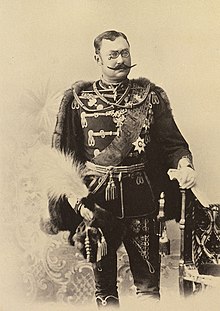William IV, Grand Duke of Luxembourg
William IV (French: Guillaume Alexandre; 22 April 1852 – 25 February 1912) was Grand Duke of Luxembourg from 17 November 1905 until his death in 1912. He succeeded his father, Adolphe. Like his father, William mostly stayed out of politics despite being vested with considerable power on paper by the Constitution.
| William IV | |
|---|---|
 | |
| Grand Duke of Luxembourg | |
| Reign | 17 November 1905 – 25 February 1912 |
| Predecessor | Adolphe |
| Successor | Marie-Adélaïde |
| Regent | Grand Duchess Maria Anna (1908–1912) |
| Prime Minister | Paul Eyschen |
| Born | 22 April 1852 Biebrich Palace, Wiesbaden, Duchy of Nassau |
| Died | 25 February 1912 (aged 59) Berg Castle, Colmar-Berg, Luxembourg |
| Burial | |
| Spouse | |
| Issue | Marie-Adélaïde, Grand Duchess of Luxembourg Charlotte, Grand Duchess of Luxembourg Hilda, Princess of Schwarzenberg Antonia, Crown Princess of Bavaria Elisabeth, Princess Ludwig Philipp of Thurn and Taxis Sophie, Princess Ernst Heinrich of Saxony |
| House | Nassau-Weilburg |
| Father | Adolphe, Grand Duke of Luxembourg |
| Mother | Princess Adelheid-Marie of Anhalt-Dessau |
| Religion | Protestantism |
William was a Protestant, the religion of the House of Nassau. He married Infanta Marie Anne of Portugal, believing that a Catholic country ought to have a Catholic monarch. Thus his heirs have been Catholic.
At the death of his uncle, Prince Nikolaus-Wilhelm in 1905, the only other legitimate male in the House of Nassau-Weilburg was William's cousin, Georg Nikolaus, Count of Merenberg, the product of a morganatic marriage. So in 1907, William declared the Counts of Merenberg non-dynastic, naming his own eldest daughter Marie-Adélaïde (1894–1924) as heiress presumptive to the grand ducal throne. She became Luxembourg's first reigning grand duchess upon her father's death in 1912, and upon her own abdication in 1919, was succeeded by her younger sister Charlotte (1896–1985). Charlotte's descendants reign until the present day.
To date, William is the last monarch of Luxembourg to die on the throne, and the last to bear a regnal number.
Marriage
editOn 21 June 1893 in Fischhorn Castle, Zell am See, he married Infanta Marie Anne of Portugal, daughter of former King Miguel I of Portugal and Princess Adelaide of Löwenstein-Wertheim-Rosenberg. The couple had six daughters:
- Marie-Adélaïde, Grand Duchess of Luxembourg (1894–1924) who remained unmarried and childless
- Charlotte, Grand Duchess of Luxembourg (1896–1985) who married her first cousin Prince Felix of Bourbon-Parma, a son of Marie Anne's younger sister.
- Princess Hilda (15 February 1897 in Berg Castle – 8 September 1979 in Berg Castle), married in Berg Castle on 29 October 1930 Adolf 10th Prince of Schwarzenberg (18 August 1890 in Frauenberg – 27 February 1950 in Bordighera),[citation needed] without issue
- Princess Antonia (1899–1954), who married Rupprecht, Crown Prince of Bavaria as his second wife
- Princess Elisabeth (7 March 1901 in Luxembourg – 2 August 1950 in Schloss Hohenburg), married in Schloss Hohenburg on 14 November 1922 Prince Ludwig Philipp of Thurn and Taxis (2 February 1901 in Regensburg – 22 April 1933 in Schloss Niederaichbach), son of Albert I, Prince of Thurn and Taxis,[citation needed] and had issue
- Princess Sophie (14 February 1902 in Berg Castle – 24 May 1941 in Munich), married at Schloss Hohenburg on 12 April 1921 Prince Ernst Heinrich of Saxony (9 December 1896 in Dresden – 14 June 1971 in Neckarhausen), youngest son of king Frederick Augustus III of Saxony,[citation needed] and had issue
Titles and honours
editTitles and styles
editAlthough the duchy of Nassau was annexed by Prussia after the Austro-Prussian war of 1866, the title of Duke of Nassau was retained by William and his heirs.[1]
Foreign honours
edit- Duchy of Anhalt: Grand Cross of Albert the Bear, 1868[2]
- Austria-Hungary: Grand Cross of St. Stephen, 1890[3]
- Baden:[4]
- Knight of the House Order of Fidelity, 1885
- Knight of the Order of Berthold the First, 1885
- Kingdom of Bavaria: Knight of St. Hubert, 1892[5]
- Brunswick: Grand Cross of Henry the Lion, 1873[6]
- Denmark: Knight of the Elephant, 23 April 1876[7]
- Netherlands: Grand Cross of the Netherlands Lion
- Kingdom of Prussia: Knight of the Black Eagle, 14 December 1890[8]
- Saxe-Weimar-Eisenach: Grand Cross of the White Falcon, 1890[9]
- Sweden-Norway:
- Knight of the Seraphim, 19 June 1889[10]
- Grand Cross of St. Olav, 27 September 1897[11]
Ancestry
edit| Ancestors of William IV, Grand Duke of Luxembourg |
|---|
Notes and references
edit- ^ Almanach de Gotha (1901), article "Luxembourg"
- ^ Hof- und Staats-Handbuch für des Herzogtum Anhalt (1883), "Herzoglicher Haus-Orden Albrecht des Bären" p. 16
- ^ "A Szent István Rend tagjai" Archived 22 December 2010 at the Wayback Machine
- ^ Hof- und Staats-Handbuch des Großherzogtum Baden (1896), "Großherzogliche Orden" pp. 62, 77
- ^ Hof- und Staats-Handbuch des Königreich Bayern (1908), "Königliche Orden" p. 8
- ^ Hof- und Staatshandbuch des Herzogtums Braunschweig für das Jahr 1908. Braunschweig 1908. Meyer. p. 9
- ^ Jørgen Pedersen (2009). Riddere af Elefantordenen, 1559–2009 (in Danish). Syddansk Universitetsforlag. p. 288. ISBN 978-87-7674-434-2.
- ^ "Schwarzer Adler-orden", Königlich Preussische Ordensliste (supp. 1890–1891) (in German), vol. 1, Berlin, 1886, p. 5 – via hathitrust.org
{{citation}}: CS1 maint: location missing publisher (link) - ^ Staatshandbuch für das Großherzogtum Sachsen / Sachsen-Weimar-Eisenach (1900), "Großherzogliche Hausorden" p. 16
- ^ Sveriges statskalender (in Swedish), 1905, p. 440, retrieved 2018-01-06 – via runeberg.org
- ^ "Den kongelige norske Sanct Olavs Orden", Norges Statskalender (in Norwegian), 1906, pp. 791–792, retrieved 17 September 2021 – via www.nb.no